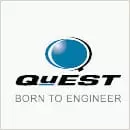In 2016, at the Farnborough Air Show, both Airbus and Boeing had made a few predictions. Airbus had expected the global MRO spends to exceed $1.8 trillion in the upcoming years. While Boeing had aimed at tripling their MRO revenue within a decade. Even as Rolls-Royce expects their installed engine base to reach 7,300 in 2025 from 3,492 in 2015, they are scaling up their core maintenance services range while focusing on engine availability, engine efficiency and asset management.
With the civil aviation sector’s current growth trajectory, airplanes with both new and comparatively older hardware are being sent to the hangar for repair. Some with single shaft engines while others with geared turbofan engines. Some with traditional aero-structures, while some have CFRP (Carbon Fiber Reinforced Polymer) parts or are made of super metal alloys. Now, if the MRO (Maintenance, Repair and Overhaul) facilities had to maintain these varied models, diverse technologies and assorted materials in the best way possible, they would need access to instructional material rooms as large as football fields. Hence, the traditional MRO had to innovate with handheld devices that could bring out the technical documentation from such humongous stockpiles and enable the engineer with the right information at the right moment.
As MRO accounts for about 15% of every airline operator’s annual costs, there needs to be even more innovations across the entire gamut of aftermarket services. Not only just in assessment, renovation, and modification of aircrafts, even the supply chain for spare parts, accessories and raw materials could be optimized with several leading-edge technologies of today to support the ever-increasing demand for varied MRO services.
Here’s a look at the five technology powered digital applications that both MRO corporations and OEMs (Original Equipment Manufacturers) could leverage to optimize, innovate and scale-up their aftermarket business models and operations.
Augmented Reality (AR) / Virtual Reality (VR) – This is no longer a possibility, but an implemented innovation that is already saving thousands of man hours, millions of dollars and innumerous nonconformances for the MRO sector. AR glasses enable faster yet enhanced training of maintenance personnel by overlaying their real-time vision with accurate technical specifications, and step-wise instructions for advanced or new tasks. With the onsite maintenance personnel’s vision being analyzed by advanced image recognition algorithms, either machine based Artificial Intelligence or offsite engineers can detect the anomaly to suggest the fastest, safest and cost-effective mode of repair.
Additive Manufacturing (3D Printing) – If the MRO folks had ever prayed for an omnipotent duct tape that was always compatible enough to be the stitch in time, the Tech Gods have answered their prayers with this boon of 3D printing. With 3D printing, various hardware innovations can be produced much quicker than traditional methods of CNC (Computer Numerical Control) machining. Moreover, by using advanced materials in printing these custom parts, both heat-resistance and actual part weight can be improved much beyond the traditional metal parts. Even supply chain failures and costly nonconformances can longer increase the MRO delays with 3D printing being implemented across several MRO facilities across the globe to reduce spare part inventory and hence reduce working capital.
Digital Twins – Due to the cost-intensive and life-risking nature of aviation, every technical repair practices or business process must be tested and certified before field implementation. However, when such test phases are extended beyond several months, the delay caused is often reflected in the profits. Expensive and intrinsic members of a fleet being grounded for months can be avoided by testing processes on dynamic digital models of the actual airplanes or the authentic schematics of the business processes with several variables factored in to allow failure prediction. Digital twin applications help OEMs and airlines in customization and improved planning to achieve optimized asset utilization.
Big Data Analytics – ‘Data is the new oil’ being the latest catchphrase crafting innovative trends across multiple industrial sectors, aviation is no exception being one of the largest proponents of technology. For instance, the latest Pratt & Whitney’s Geared Turbofan engine is fitted with 5,000 sensors and generates up to 10 GB of data per second. Such data recorded and analyzed at a global fleet level is capable of implementing predictive maintenance and supply-chain demand prediction to create the future of connected aviation. Big data analytics is already extending asset lifecycles and helping to reduce component replacement costs and downtime with better equipment availability, product quality and optimization of maintenance personnel.
Digitizing Processes with AI – Artificial Intelligence (AI) is being implemented by OEMs, suppliers and MRO corporations for enabling autonomous response to incoming customer communication, remotely diagnosing malfunctions with pattern recognition, and proposing suggestions for up-selling services. It helps cost savings with efficiency improvements and optimal predictions to supercharge the supply chain.
At QuEST Global, we have been striving every day to empower our clients with various use-cases from the above mentioned digital applications. Working with several pioneers in the aviation sector, we have proven experience in augmenting field service solutions with AR, additive manufacturing and digital twin technology. If you are looking for trusted engineering partners with proven experience, to innovate and transform your MRO services, talk to us at the upcoming Farnborough Air Show 2018 at Hall 1 Booth #1570.

It has come to our attention that scammers have tried to mislead people by fictitiously claiming to be employees of Quest Global or posing as authorized recruitment partners. These entities are misguiding job-seekers by promising well-placed roles with our company and asking candidates to pay for a certification course with a promise of reimbursement once they have joined. Kindly note, Quest Global conducts a formal interview process in our search for extraordinary people. We would NEVER ask candidates to pay for certifications at any stage of the recruitment process.
If you have questions or concerns, please email us at [email protected].